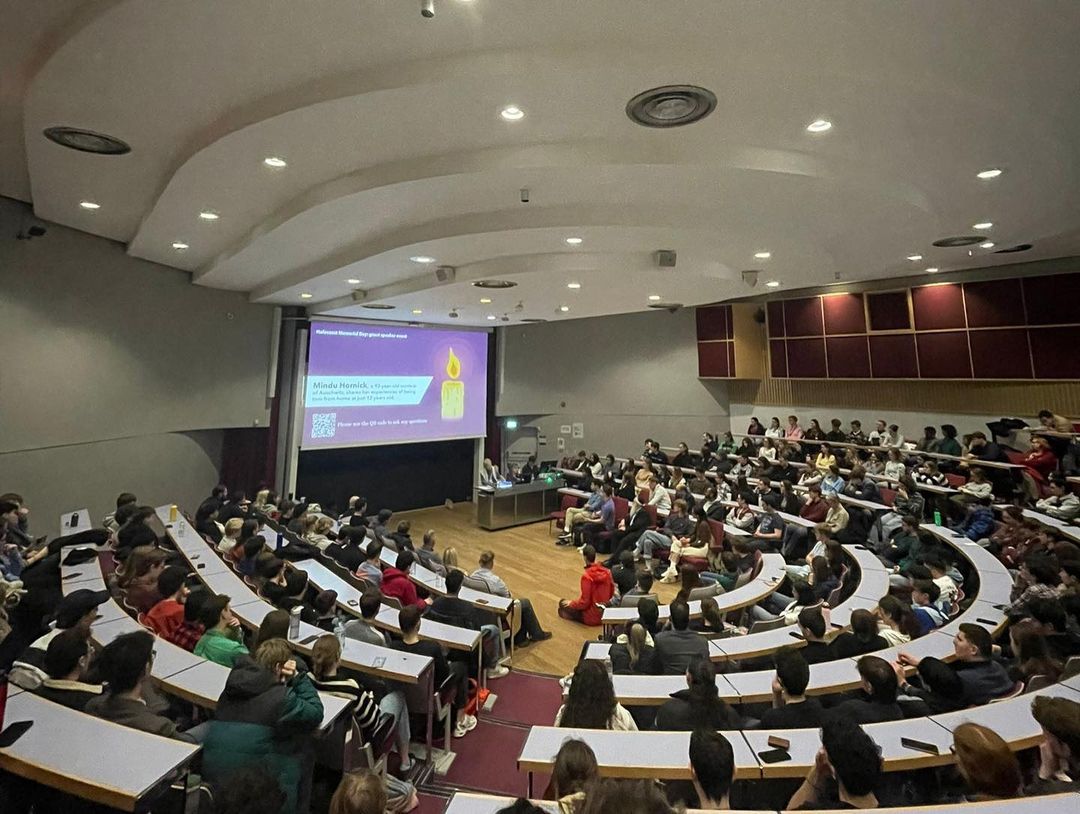‘When everything changed in 1941’ – Holocaust survivor speaks on her experience at Warwick Arts Centre
On Wednesday 31 January, Mindu Hornick, a survivor of the Holocaust, told her story at the University of Warwick’s Arts Centre.
Organised and led by Warwick’s Jewish Society (JSoc), the talk took place in the Arts Centre’s Woods-Scawen Room. The event, held in commemoration of Holocaust Memorial Week, was extremely popular amongst the University’s students, with many having to stand at the back of the auditorium due to a lack of available seating.
The 93-year-old spoke for an hour, recounting her first-hand experience of the horrors of the Auschwitz and Bergen-Belsen concentration camps.
Born in Czechoslovakia, Hornick told her story of her “idyllic” pre-war life, reminiscing on her mother’s freshly baked challahs and the beautiful orchard in her garden. Shortly after, she began to recall the inescapable adversity that she faced after Hitler gave the order to rid Slovakia of all Jews.
“Auschwitz is not something I could possibly describe in a few sentences; there is no language to describe the experience”
Mindu Hornick, Holocaust Survivor
Hornick retraced the memories of being forced on carriages packed with other Jewish victims going to “the concentration camp that came to be known as Auschwitz”. Hornick told the audience: “Auschwitz is not something I could possibly describe in a few sentences; there is no language to describe the experience.”
Having taken advice from “a man in striped clothing”, who told Hornick and her sister to lie about their ages, Hornick escaped the gas chambers of the death camp and was instead subjected to slave labour. She spoke of the “very strange smell” encountered upon arrival, later mentioning that she and her fellow inmates “thought we had entered hell” due to the piles of bodies and lack of nature.
Hornick won an MBE in 2019 for her commitment to educating and commemorating the Holocaust. She admitted that she was incapable of being able to tell her story for 40 years. Hornick explained: “By sharing our experiences, we share how the unbelievable has happened to us and should never happen again, and yet it does.”
“Humanity seems to be incapable from learning from the past”
Mindu Hornick, Holocaust Survivor
Students who attended the talk were visibly shocked and reflective about the traumas that Hornick discussed throughout her talk. She mentioned that guards pricked blood from the fingers of those who looked unwell and smeared it across inmates’ cheeks to give them a “healthier look”. Another recollection was that of a child being hung for eating potato peelings off the floor, in response to a question asked regarding her strength of faith during the Holocaust, to which she replied: “Of course, we asked, for God’s sake, where’s God?”
Persuaded initially by her Rabbi, Hornick has returned to Auschwitz twice in her lifetime, confessing that the trauma was so strong after her first visit that it left her couch-bound for weeks.
She expressed that her decision to speak out was encouraged by Holocaust denialism, recurring incidents of antisemitism, and the fact that fewer and fewer victims lived to tell their truth.
Hornick articulated: “Humanity seems to be incapable from learning from the past.” She noted that 49 years after the Holocaust, Rwanda saw one of the worst genocides in history against the Tutsis. The Rwandan genocide was itself only 15 years prior to the Khmer Rouge’s killing of 2.2 million Cambodians.
For Hornick, these repetitions of history as well as the Israel-Hamas conflict illustrate how “lessons on the past on how nations and countries treat each other have not been learned”. Racially charged hatred has continued long after WWII, which is why Hornick is committed to tolerance and “education that will bring to the future and the present and endorse the words ‘never again’”.

Comments